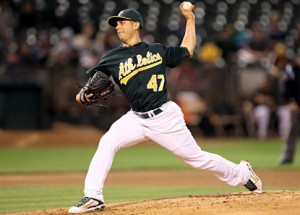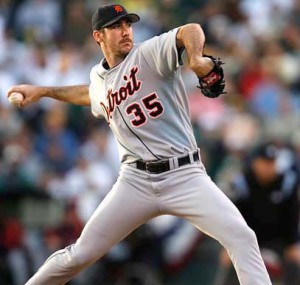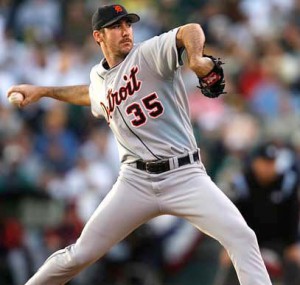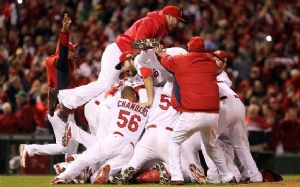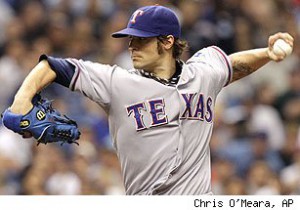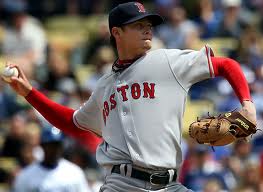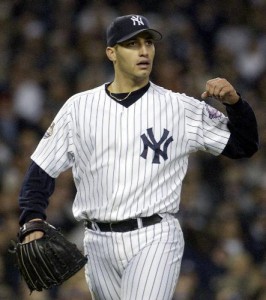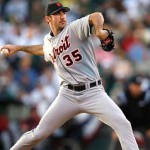
Verlander has already given the Tigers a huge leg up in their divisional series. Photo unknown via rumorsanddrants.com
As we have already seen in the playoffs thus far, predicting these coin-flip games, or predicting the outcome of individual games, is usually fool’s gold. The first four games of the playoffs featured four Road-team wins. You can argue that the higher-seeded teams in the divisional series are “better” than the home teams and this was to be expected … except that we’re talking about divisional winners/90+ win teams all around. So far, the results have been surprising.
What’s also been tough this year is the lack of “announced” starters. The Tigers seem to know exactly who they’re throwing for all 5 games of the series … but nobody else does. Baltimore’s only announced starter (Jason Hammel) hasn’t pitched since September 11th and they have a handful of guys to pick from. In last year’s version of this post I was able to do match-up analysis. This year i’ll just look at the breadth of the starters to see who has an upper hand.
Washington-St. Louis:
- Washington’s likely starters: Gonzalez, Zimmermann, Jackson, Detwiler
- St. Louis’ likely starters: Wainwright, Garcia, Carpenter, Lohse
I’ve already talked at depth about this series in my previous post. Just looking at starters, its hard not to see the Nats as the favorite. Our Ace Gonzalez goes twice in the series, St. Louis doesn’t hit righties as well. Carpenter could be a difference maker.
Detroit-Oakland:
- Oakland’s likely starters: Parker, Milone, Anderson, Blackley
- Detroit’s likely starters: Verlander, Fister, Sanchez and Scherzer
Justin Verlander is as close to unbeatable as there is, again evidenced by his game 1 dominance. (7ip, 3 hits one solo home run). If he’s set to go in game 4, Oakland basically has to win out. The rest of Detroit’s planned starters all sport sub 4.00 ERAs and all of them have at least a 113 ERA+. In fact, how exactly is this only an 88 win team? They have three unbelievable hitters in the middle of their order and plus starting pitching. Max Scherzer and his dominating fastball apparently has recovered enough from a post-game celebration injury and should take the ball in Game 4. Anibel Sanchez has been pretty effective since arriving from Miami in a mid-season trade (is Sanchez an off-season FA target of the Nats for their 5th starter?) and should give the Tigers a great chance to win his game 3 start.
Meanwhile, Oakland has a slew of rookie starters to choose from, all of whom sport sub 4.00 ERAs (the worst season ERA on the staff is Travis Blackley, who may or may not feature in the post-season). Jarrod Parker threw game one and was effective, just not effective enough. I was surprised to see Tommy Milone slated as the game 2 starter (perhaps chosen by virtue of his home/away splits; 2.74 ERA at home, 4.83 ERA away). After that I honestly have no idea who we’ll see. Oakland named 5 starters to its post-season roster, but AJ Griffen was pasted in his last outing and may be a long-man/emergency starter. Brett Anderson is clearly the staff Ace at this point but only returned in late August. Oakland’s been on such a tear though, its hard to bet against them.
Prediction: Verlander already gave Detroit the huge advantage with a game 1 victory. Oakland needs more magic to advance.
New York-Baltimore:
- Baltimore’s likely starters: Hammel, Tillman, Chen, Saunders
- New York’s likely starters: Sabathia, Pettitte, Kuroda, Phelps?
Baltimore’s only announced starter as of today is Jason Hammel, who (as noted above) hasn’t thrown in 3 weeks. After that? The Orioles used 12 different starters on the season and at one point demoted 3/5ths of their rotation in a week. They seem set to roll out the above named guys after Hammel, but this leaves out both Miguel Gonzalez and Steve Johnson, who were effective down the stretch. I can’t find a link for Baltimore’s named divisional roster as of the time of this writing; which would have helped.
Meanwhile, looking at New York’s options past the above named three guys, I would initially guess that New York is going to a 3-man rotation for the playoffs. What would you rather do? See three effective veterans going on 3 days rest, or to give post-season starts to the likes of Phil Hughes or Ivan Nova? Freddie Garcia lost his starting spot in September when Pettitte returned but isn’t an option because of how ineffective he’s been all season. Would you give a game-4 start to rookie David Phelps? It seems amazing to me that the highest payroll team in the league can’t find an effective 4th and 5th starter (getting Pettitte out of retirement? Giving Garcia 17 starts after signing him off the trash heap?) and I think it continues to be their downfall (only one World Series appearance in 8 years).
New York swept the Orioles in the first series of the season, split a 2-game set in mid-season, but lost EVERY other series exactly 2 games to 1 on the season. Is there any reason not to think they’ll do something similar in this series? I see a split in Baltimore and then New York struggling to win 2 of 3 in New York. Does Sabathia struggle going on 3 days rest? More importantly, does Pettitte?? He should be on a golf course right now, not pitching in October. It should be interesting to see if New York uses a 4th starter.
San Francisco-Cincinnati:
- San Francisco’s likely starters: Cain, Bumgarner, Vogelsong, Lincecum
- New York’s likely starters: Cueto, Arroyo, Latos, Bailey
We’ve already seen some interesting mishaps with Cincinnati’s best laid plans; Cueto out with bask spasms after just 2 batters, planned game 3 starter Latos forced into action. Now it looks like Cueto will go game 3, with Bailey either pushed to game 4 or skipped outright since Latos only threw 4 innings in game 1. Or perhaps Bailey goes game 4 with Latos pushed to a possible game 5. Either way, the wild-cards here are Cueto’s health and Arroyo’s effectiveness. If Cueto returns for a game 3 start, with Cincinnati haven already “stolen” a game against SF’s ace, the Giants are in trouble.
Meanwhile, has San Francisco made a decision on its starters? They’ve named all 5 (the above four plus Barry Zito) to the post-season roster with an unnamed player dropping to the bullpen. I think they’ll go with supposed ace Tim Lincecum as the 4th starter despite Zito’s numbers being superior. Meanwhile, Ryan Vogelsong has been vulnerable down the stretch despite good numbers on the season.
I think the back-end of the Giant’s rotation is a huge question mark, and if the Reds have already stolen a game against Cain, this series may be short.
